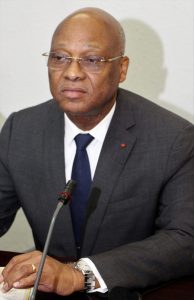ECOWAS COMMISSION PRESIDENT TO PARTICIPATE AT THE SIDELINE MEETING ON SUSTAINABLE PEACE IN NEW YORK

The President of the Commission of the Economic Community of West African States (ECOWAS) Mr. Jean-Claude Kassi Brou is among the leading figures who are billed to speak at the sideline event of the High-Level Meeting on sustainable peace, on the 25th of April 2018 in New York, U.S.A
The sideline event is to be hosted by the government of Switzerland in Collaboration with ECOWAS, the Group of Most Developed Countries (G7), the United Nations Peace building Support Office as well as the United Nations Development Programme (UNDP), in association with the Center for International Cooperation and Institute for Security Studies.
The leaders are to discuss majorly: Sustaining Peace in Action–Windows of Opportunity to Build More Peaceful, Just and Inclusive societies.
Among other objectives, the sideline meeting is expected to draw on national experiences in exploring windows of opportunity for sustaining peace. It will also explore how countries identify, assess, and prioritize risks, create opportunities to build trust and momentum, and develop nationally owned strategies for building more peaceful, just, and inclusive societies.
The meeting will emphasize the importance of platforms for engagement and communication between State and citizens as well as between contesting political actions, and of more inclusive approaches in areas such as justice, security, gender, human rights, and other issues.
Central to the deliberation of the leaders is the idea of working with national actors to address the root causes of conflict, including the provision of technical assistance and capacity building support to the rule of law, police, judiciary, prevention of violence against women strategies, and other state functions, and by promoting social, political, and economic inclusion.
Also critical to their endeavour is the realization that windows of opportunity are difficult to identify in advance even as they take many different forms ranging from elections, political agreements, and economic shocks to natural disasters. These are seen as moments when coalitions can be formed, leadership demonstrated, and reforms launched, thus harnessing or consolidating pathways for peace.
While in New York, the leaders will also focus on the potential for international and regional actors to bring together political, security and development approaches to support governments and other national stakeholders.
They will use the gathering to explore how they can help build consensus behind sustained approaches to prevention in countries affected by (or at risk from conflict) while encouraging the alignment of national, regional and international priorities through the universal framework set out in the Sustainable Development Goals (SDGs).
In its Report on prevention, the United Nations (UN) and World Bank set out principles for those working to sustain peace which sees effective prevention actively targeting the grievance and institutional weaknesses that increase the risk of conflict.
The Report expands the scope of action for governments, rather than undermining their sovereignty, and builds inclusive partnerships. It also responds to windows of opportunity to begin the move towards a more peaceful, just and inclusive society, while sustaining prevention over the time needed to increase resilience to multiple forms of risk.
The sideline meeting has become imperative owing to increasing global conflicts. The leaders are conscious of the fact that changing the underlining causes of conflict requires long-term investments. Yet they also know that decisive action at critical moments has now become vital to the sustenance of peace.



